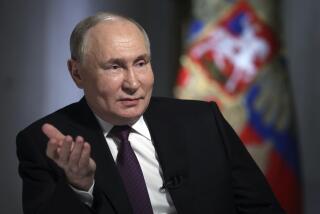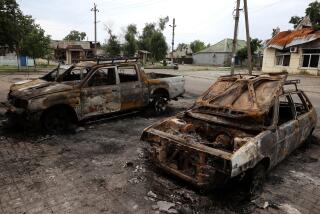Airstrikes--Advisable or Not?
WASHINGTON — To find out how important Iraq’s arsenal of chemical and biological weapons is to President Saddam Hussein, just do the math.
Baghdad has passed up potential oil revenue totaling more than $100 billion since mid-1991 because it has refused to cooperate with a United Nations-sponsored program to destroy its capacity for producing weapons of mass destruction.
For the Clinton administration, the implication is clear: If maintaining a chemical and biological arms capability is worth that much to Hussein, his intentions must be truly frightening.
But is that implication alone enough to warrant bombing Iraq?
It is the single question at the core of the worldwide debate over the use of force against Hussein. And it can be argued effectively either way.
Russia, France and observers in other countries as well as in the U.S. say Hussein would never use the weapons because he knows that to do so would almost certainly lead to an international military onslaught and his downfall.
“If he hits the Israelis with either chemical or biological weapons, he will get nuked,” said Tim Travan, an Iraq watcher at the International Institute of Strategic Studies in London. “If Saddam’s overwhelming imperative is to remain in power, that is not a good way to go about it. . . . If he uses them against the U.S. or the U.K., it would be a justification for a new land war to go all the way to Baghdad.”
Travan said the Arab states would be less able than Israel and the United States to retaliate directly. But, he said, if Iraq used unconventional arms against anyone, it would forfeit any sympathy it might have generated as a small country threatened by the world’s remaining superpower.
The administration counters that Iraq has enough chemical and biological weaponry to kill the entire populations of several big cities and may be willing to use it regardless of the consequences.
“This man is the only repeat offender around with chemical weapons,” President Clinton said Friday. “He used them on his own people. He used them on the Iranians.”
U.N. weapons inspectors, American intelligence agencies and many nongovernmental experts agree that Iraq’s inventory of chemical and biological weapons is large, varied and alarming. Even most opponents of military action do not dispute that conclusion.
Administration officials concede that even sustained bombing is unlikely to destroy all of Iraq’s capacity for producing those weapons.
*
Critics of military action say that alone is reason enough to refrain from any such action, because Hussein is more likely to use his chemical and biological weapons to retaliate for an attack than he is to initiate combat with them.
“He doesn’t have any real conventional ability to project power much beyond Kuwait,” said Goeffrey Kemp, White House Middle East expert in the Reagan administration. “He could use biological weapons for revenge against us and Israel. I would say he would be more likely to do that if he thought his neck was ready to be broken by American bombs.”
But Richard Haass, who held the White House Middle East post in the Bush administration, said it is dangerous to delay.
“Diplomacy is not enough if every day that goes by gives Saddam and his scientists more time to mix up another batch of biological Kool-Aid,” Haass said.
When the U.N. Security Council passed the resolution approving a cease-fire in the Persian Gulf War in 1991, it ordered destruction of Iraq’s nuclear, chemical and biological warfare programs and of the missiles that could be used to deliver such weapons. The U.N. assumed that, with Iraqi cooperation, the job could be completed in three months, clearing the way for an early lifting of wartime economic sanctions against Iraq.
But Iraq did not cooperate, and the U.N. effort has dragged on for almost seven years.
With sanctions in place, Baghdad is prohibited from selling its oil except under the limited oil-for-food plan. That allows the sale of $2 billion worth of petroleum every six months, with the United Nations carefully monitoring the proceeds to ensure that the money goes only for food, medicine and war reparations.
Amatzia Baram, chairman of the Middle Eastern history department at Israel’s Haifa University, estimates that Iraq could easily have sold $15 billion worth of oil every year since mid-1991 if it had cooperated fully with U.N. arms inspectors. That totals $105 billion in lost revenue and does not even count the cost of the arms programs, which could be another $35 billion, Baram estimates.
Why would Hussein mortgage so much of his economy to develop chemical and biological arms? Baram speculates that the reason is primarily image.
“It may sound like science fiction, but the single most important reason is Saddam’s vision of his role in history as a savior of the Arab world,” Baram said. “He is comparing himself with Saladin,” the Arab leader who drove the Crusaders out of Jerusalem 800 years ago.
“If he gives his weapons away voluntarily, then his machismo is lost,” Baram said. “That’s worth $100 billion.”
What did Hussein do instead?
Travan said Iraq imported 450 tons of chemicals that could be converted into VX, a nerve agent so lethal that a few drops on the unbroken skin or a whiff of vapor is enough to kill. Fewer than 250 tons of those chemicals have been destroyed, leaving more than 200 tons unaccounted for.
Iraq maintains that it has already disposed of all of its nuclear, chemical and biological weaponry.
U.N. inspectors believe that the nuclear program is gone because the Iraqis provided convincing proof. There is no similar proof of destruction in the chemical and biological spheres.
“Whenever Iraq has had it in its interest to provide the evidence to prove its version of events, it has been able to do so,” Travan said. “The only conclusion you can come to is that chemical and biological arms haven’t been destroyed, and they want to hide them.”
More to Read
Sign up for Essential California
The most important California stories and recommendations in your inbox every morning.
You may occasionally receive promotional content from the Los Angeles Times.










